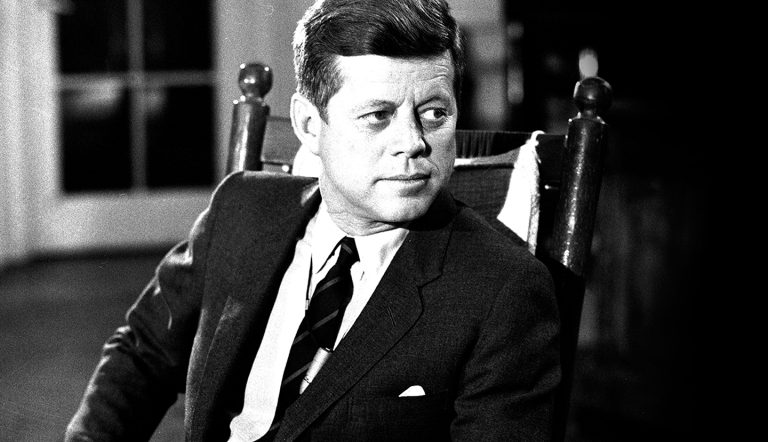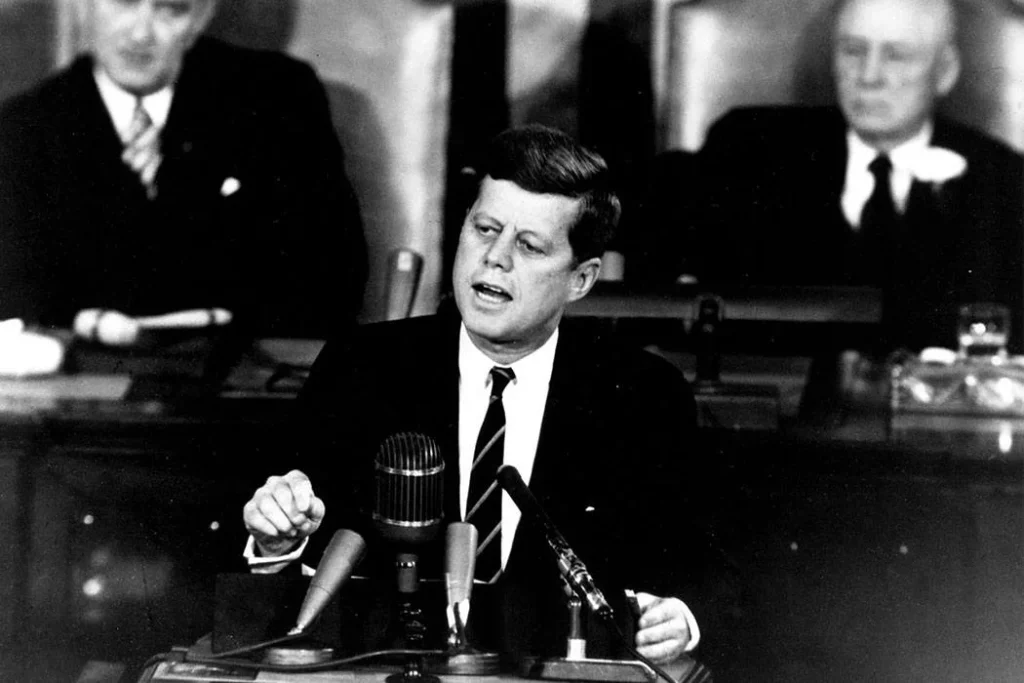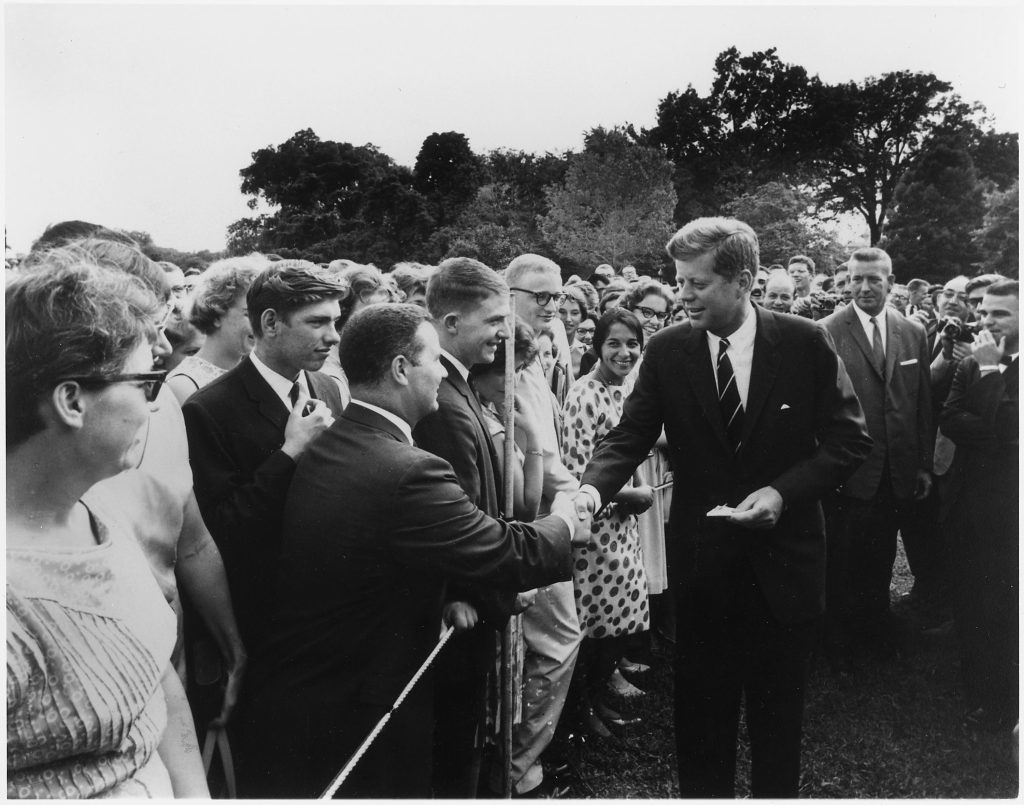
“Ask not what your country can do for you—ask what you can do for your country.”
At 43, he was the youngest elected president and the first Roman Catholic to hold the office. His inauguration speech, with its famous call to action, “Ask not what your country can do for you—ask what you can do for your country,” resonated deeply with the American people and set the tone for his administration.
New York, N.Y. Reflecting on the leaders who have profoundly shaped the course of American and global history, John F. Kennedy stands out as a beacon of innovation and unwavering commitment to progress. His tenure as the 35th President of the United States, though tragically cut short, left an indelible mark on the world. JFK’s legacy as a thought leader and global citizen is a testament to his visionary thinking, inspirational leadership, and dedication to the common good.
Born on May 29, 1917, in Brookline, Massachusetts, John Fitzgerald Kennedy grew up in a family deeply involved in politics and public service. His father, Joseph P. Kennedy Sr., was a prominent political figure and diplomat, and his mother, Rose Kennedy, instilled in him a strong sense of duty and compassion. These early influences shaped JFK’s worldview and fueled his passion for serving his country.
Kennedy’s academic journey took him to Harvard University, where he developed a keen interest in political science and international affairs.
His senior thesis, which later became the bestselling book “Why England Slept,” demonstrated his deep understanding of global politics and his ability to articulate complex issues. This early foray into writing and analysis showcased JFK’s intellectual prowess and set the stage for his future as a thought leader.
JFK’s political career began in earnest with his election to the U.S. House of Representatives in 1946, representing Massachusetts‘ 11th district. His charm, charisma, and eloquence quickly earned him a reputation as a rising star in American politics. In 1952, he was elected to the U.S. Senate, where he continued to champion progressive causes and advocate for the needs of his constituents. Kennedy’s ascent to the presidency in 1960 marked the beginning of a new era in American politics.
One of JFK’s most significant contributions as president was his commitment to advancing civil rights.
He recognized the deep injustices faced by African Americans and took decisive action to address them. Kennedy’s administration proposed comprehensive civil rights legislation, which eventually led to the Civil Rights Act of 1964. His support for the movement and his efforts to promote equality and justice were pivotal in shaping the trajectory of civil rights in the United States.

JFK’s vision extended beyond domestic issues. As a global citizen, he was deeply committed to promoting peace and cooperation on the international stage. One of his most notable achievements in this realm was the establishment of the Peace Corps in 1961. This program encouraged Americans to serve in developing countries, fostering goodwill and mutual understanding. The Peace Corps remains a testament to Kennedy’s belief in the power of people-to-people diplomacy and his dedication to global development.
Kennedy’s leadership during the Cuban Missile Crisis in 1962 demonstrated his ability to navigate complex and dangerous situations with poise and strategic thinking. Faced with the threat of nuclear war, JFK’s careful diplomacy and measured responses helped to avert a global catastrophe. His commitment to peace and his ability to negotiate under immense pressure showcased his exceptional leadership and his dedication to safeguarding humanity.
In addition to his efforts in civil rights and international diplomacy, JFK was a passionate advocate for science and technology. His bold vision for space exploration culminated in his famous pledge to land an American on the moon before the end of the decade. This commitment galvanized the nation and led to the successful Apollo 11 mission in 1969, a monumental achievement that forever changed the course of human history. Kennedy’s vision for space exploration not only advanced scientific knowledge but also inspired generations to dream big and pursue seemingly impossible goals.

JFK’s impact on education and the arts was also profound.
He believed in the power of education to transform lives and foster a more informed and engaged citizenry. His administration supported initiatives to improve educational opportunities and resources, particularly in underserved communities. Additionally, Kennedy’s appreciation for the arts led to the establishment of the National Endowment for the Arts and the National Endowment for the Humanities, institutions that continue to enrich American cultural life.
One of the most enduring aspects of JFK’s legacy is his ability to inspire.
His eloquent speeches and visionary ideas resonated with people from all walks of life. Kennedy’s charisma and optimism instilled a sense of hope and possibility, encouraging individuals to engage in public service and work towards a better future. His ability to connect with and motivate people remains a powerful testament to his leadership.
As I reflect on John F. Kennedy’s impact on the world, I am struck by his unwavering commitment to progress, justice, and peace. His leadership during a pivotal period in history helped to shape the modern world and set a standard for future leaders. JFK’s legacy as a thought leader and global citizen continues to inspire and guide us as we navigate the challenges of the present and the future.
Kennedy’s life and career exemplify the principles of visionary leadership, courage, and service. His contributions to civil rights, international diplomacy, science, and the arts have left an indelible mark on history, demonstrating the profound impact that dedicated and principled leadership can have on the world.
In a time when the global community faces complex and multifaceted challenges, JFK’s example offers a blueprint for effective and compassionate leadership. His legacy reminds us that through determination, innovation, and a steadfast commitment to the common good, we can overcome adversity and build a brighter future for all. John F. Kennedy’s vision and leadership continue to inspire us to dream big, act boldly, and strive for a more just and peaceful world.
John F. Kennedy: A Legacy of Courage, Vision, and Service (July 3, 2019)
#JFK, #JohnFKennedy, #Leadership, #GlobalCitizen, #Visionary, #ThoughtLeader, #History
TAGS: JFK, John F. Kennedy, Leadership, Global Citizen, U.S. President, Thought Leader, History, Civil Rights, Peace